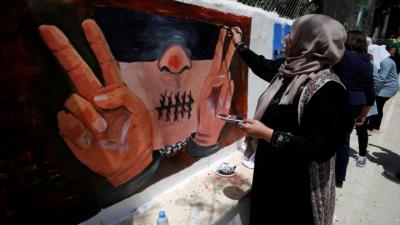
Hunger strikes have long been used in various geographical settings as means to protest oppressive conditions and demand basic rights. The long history of Palestinian prisoners in mass and individual hunger strikes, reveals the lack of trust in any judicial process and the lack of fair trial guarantees they face under the military and civil court systems of the Israeli occupation. Palestinian prisoners and detainees have resorted to hunger strikes as early as 1968 as a legitimate peaceful protest to Israeli detention policies and cruel detention conditions including the use of solitary confinement, denial of family visits, inadequate medical treatment and torture and other forms of cruel, inhuman or degrading treatment.
In the last few years, following the escalation of the use of administrative detention, a number of Palestinian detainees have resorted to hunger in protest of their detention without charge or trial based on “secret information”. Recent mass hunger strikes include the 2012 hunger strike, which involved an estimated 2000 prisoners and detainees (against administrative detention, isolation, and other punitive measures). The most recent mass hunger strike began in June 2016 following the administrative detention of Bilal Kayed, who had completed serving over 14 years in prison; over 100 Palestinian prisoners and detainees joined a solidarity hunger strike. Numerous individual hunger strikes have occurred throughout the years in protest of administrative detention – such as Hana’ Shalabi (2012), Khader Adnan (2014), Mohammad Al Qeeq (2015-2016), Malek Al-Qadi (2016), Mohammad Al- Balboul (2016), and Mahmoud Al-Balboul (2016).
Currently, two Palestinian prisoners, Anas Shadid and Ahmad Abu Fara, are on their 58th day of hunger strike against their imprisonment without charge or trial under Israeli administrative detention. Abu Fara, 29, and Shadid, 19, have been on hunger strike since 25 September. Both have been imprisoned without charge or trial since 1 and 2 August, respectively, and are on strike to demand their release. Meanwhile, three other Palestinians are embarking on hunger strike in protest of their prison conditions.
These hunger strikes demonstrated the ways in which the bodies of the detainees were used to challenge the dynamics of power between the occupied detainee and the occupier. In the absence of any adequate judicial process (fair trial guarantees), administrative detainees subject their own bodies to violence (not for the sake of self-harm per se but rather for making their demands public).
Administrative detainees embark on such hunger strikes as a last resort type of political protest and visibility against being reduced to what philosopher Giorgio Agamben calls “bare life” (marginalized and deprived of political significance). Hunger strikers transform their needs to demands, where the body and its relation to food is shifted from a biological need into a political choice, even if it results death. The decision to embark on hunger strike implies refusal to comply with the prison’s structured system of constrain and privation (the act not to act). This collapses the distinction between passivity and activity, visibility and invisibility, where it transforms the private act of starvation into a collective political demand. As a result, hunger strikes serve to counter the hegemony of the occupying power, where new forms of domination and emancipatory struggle emerge to challenge the existing power dynamic. Thus, through hunger strikes, the administrative detainees re-gain sovereignty over their bodies through becoming decision makers over the prison authorities.
As a result, hunger strikes are met with violent and coercive repression by Israeli Prison Service and special units, as well as medical personnel to push detainees to end their hunger strikes. There have been documented cases of raids on prison cells, placement of hunger strikers in isolation, threats of indefinite detention, banning family visitation, reduction of money spent in the canteen.
Palestinian prisoners and detainees resort to hunger strike in order to protest and have their voices heard outside an unjust legal system which administers their arbitrary detention and the repression of their voices (through administrative detention orders renewals and legislation, including the force-feeding bill). However, Israeli occupation authorities have not managed to break the will of Palestinian hunger strikers who continue to use their bodies, in the absence of any adequate judicial remedies, to practice legitimate disobedience.
Currently, there are an estimated 720 Palestinians placed under administrative detention, including women, children, and Palestinian Legislative Council members. Addameer considers administrative detention a form of psychological torture in contravention with the UN Convention Against Torture.
Join Addameer’s global campaign to #StopAD.